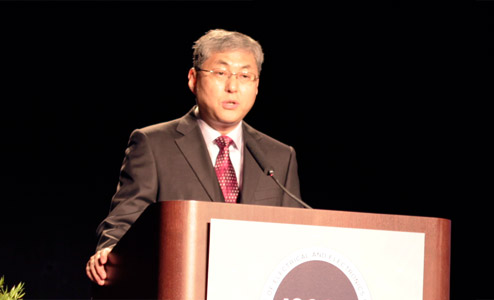Through this homepage, we would like to share our sweats, pains, excitements and experiences with you. Surely, the design of
complicated SoCs is a painful and time consuming job but we believe our SoCs will open up new devices, new applications and
new cultures in our society. Our zeal, our efforts and even our lives are contained in our SoCs which clearly demonstrate
our visions and philosophies for the future.


Humanistic Design is the theme of SSL. We are developing SoCs for the health of human beings and for helping people to live creative lives. Through our SoCs,
human beings will be connected together to make a ubiquitous intelligence society. Our SoCs will interact with the human body directly; in other words
humanism will be integrated on our SoCs. Together with SDIA (System Design Innovation and Application research center) we will apply our SoCs for intelligent
robots, wearable computers and bio-healthcare applications.
We pioneered human body channel communication technology and now it is almost ready to be commercialized. We changed digital hearing aid technology
into more convenient and humanistic technology like smart earphone for digital music. Low energy processors and ‘planar fashionable circuit board' or direct
packaging on fabric technologies have been studied for more convenient wearable computers. Integration of neural network with parallel processor by
Network on Chip is actively studied for various applications such as pattern recognition and robot vision. Our previous researches on 3D graphics and network
on chip which placed SSL as a world leading research laboratory contributed to the blossoms of the recent ground-breaking researches.
During the 13 years since the birth of SSL in KAIST, SSL members made 209 presentations at world top level conferences such as ISSCC, Symposium on VLSI
Circuits, CICC, A-SSCC and ESSCIRC, and published 88 papers in IEEE journals. In the same years, we received 142 patents and successfully completed national
and industrial projects of which the total budget is 4 million dollars or annual average 400 thousand dollars. We produced 23 Ph.D. graduates and 13 M.S.
graduates over the same period. In the coming future, SSL with SDIA, our sister research center, will make its best efforts to continue leading researches in SoC
and SiP for bio-healthcare applications, wearable computers and robots.
Thank you!
Feb. 4, 2013
Hoi-Jun Yoo, Tenured Professor, IEEE Fellow

